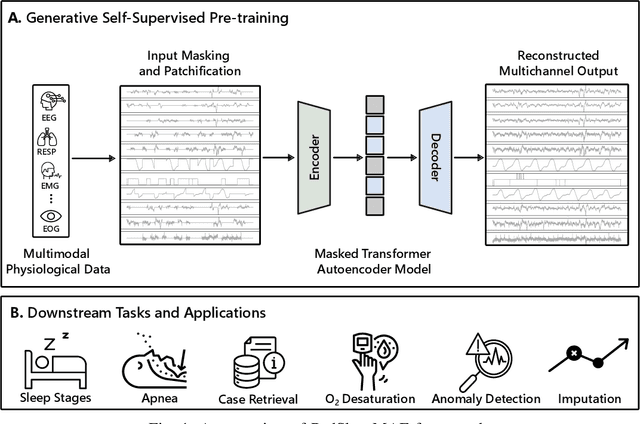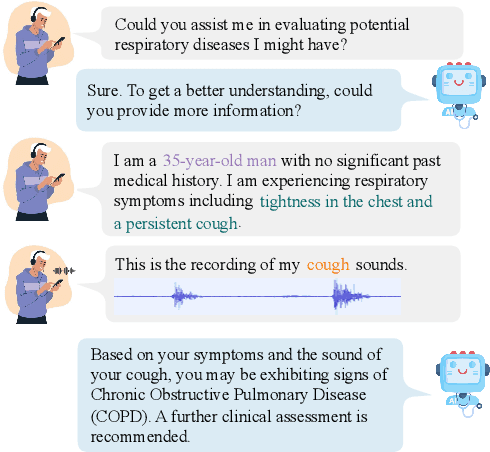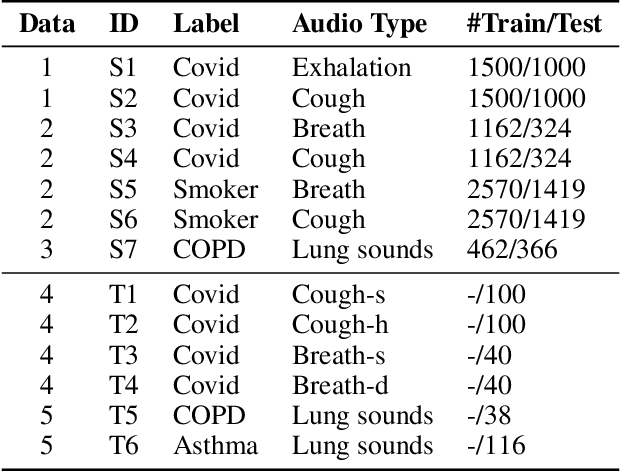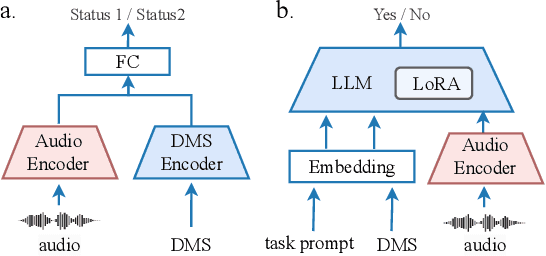Aaqib Saeed
UniPACT: A Multimodal Framework for Prognostic Question Answering on Raw ECG and Structured EHR
Jan 25, 2026Abstract:Accurate clinical prognosis requires synthesizing structured Electronic Health Records (EHRs) with real-time physiological signals like the Electrocardiogram (ECG). Large Language Models (LLMs) offer a powerful reasoning engine for this task but struggle to natively process these heterogeneous, non-textual data types. To address this, we propose UniPACT (Unified Prognostic Question Answering for Clinical Time-series), a unified framework for prognostic question answering that bridges this modality gap. UniPACT's core contribution is a structured prompting mechanism that converts numerical EHR data into semantically rich text. This textualized patient context is then fused with representations learned directly from raw ECG waveforms, enabling an LLM to reason over both modalities holistically. We evaluate UniPACT on the comprehensive MDS-ED benchmark, it achieves a state-of-the-art mean AUROC of 89.37% across a diverse set of prognostic tasks including diagnosis, deterioration, ICU admission, and mortality, outperforming specialized baselines. Further analysis demonstrates that our multimodal, multi-task approach is critical for performance and provides robustness in missing data scenarios.
Interpretable Multimodal Zero-Shot ECG Diagnosis via Structured Clinical Knowledge Alignment
Oct 24, 2025



Abstract:Electrocardiogram (ECG) interpretation is essential for cardiovascular disease diagnosis, but current automated systems often struggle with transparency and generalization to unseen conditions. To address this, we introduce ZETA, a zero-shot multimodal framework designed for interpretable ECG diagnosis aligned with clinical workflows. ZETA uniquely compares ECG signals against structured positive and negative clinical observations, which are curated through an LLM-assisted, expert-validated process, thereby mimicking differential diagnosis. Our approach leverages a pre-trained multimodal model to align ECG and text embeddings without disease-specific fine-tuning. Empirical evaluations demonstrate ZETA's competitive zero-shot classification performance and, importantly, provide qualitative and quantitative evidence of enhanced interpretability, grounding predictions in specific, clinically relevant positive and negative diagnostic features. ZETA underscores the potential of aligning ECG analysis with structured clinical knowledge for building more transparent, generalizable, and trustworthy AI diagnostic systems. We will release the curated observation dataset and code to facilitate future research.
Helmsman: Autonomous Synthesis of Federated Learning Systems via Multi-Agent Collaboration
Oct 16, 2025Abstract:Federated Learning (FL) offers a powerful paradigm for training models on decentralized data, but its promise is often undermined by the immense complexity of designing and deploying robust systems. The need to select, combine, and tune strategies for multifaceted challenges like data heterogeneity and system constraints has become a critical bottleneck, resulting in brittle, bespoke solutions. To address this, we introduce Helmsman, a novel multi-agent system that automates the end-to-end synthesis of federated learning systems from high-level user specifications. It emulates a principled research and development workflow through three collaborative phases: (1) interactive human-in-the-loop planning to formulate a sound research plan, (2) modular code generation by supervised agent teams, and (3) a closed-loop of autonomous evaluation and refinement in a sandboxed simulation environment. To facilitate rigorous evaluation, we also introduce AgentFL-Bench, a new benchmark comprising 16 diverse tasks designed to assess the system-level generation capabilities of agentic systems in FL. Extensive experiments demonstrate that our approach generates solutions competitive with, and often superior to, established hand-crafted baselines. Our work represents a significant step towards the automated engineering of complex decentralized AI systems.
Unified Multi-task Learning for Voice-Based Detection of Diverse Clinical Conditions
Aug 28, 2025Abstract:Voice-based health assessment offers unprecedented opportunities for scalable, non-invasive disease screening, yet existing approaches typically focus on single conditions and fail to leverage the rich, multi-faceted information embedded in speech. We present MARVEL (Multi-task Acoustic Representations for Voice-based Health Analysis), a privacy-conscious multitask learning framework that simultaneously detects nine distinct neurological, respiratory, and voice disorders using only derived acoustic features, eliminating the need for raw audio transmission. Our dual-branch architecture employs specialized encoders with task-specific heads sharing a common acoustic backbone, enabling effective cross-condition knowledge transfer. Evaluated on the large-scale Bridge2AI-Voice v2.0 dataset, MARVEL achieves an overall AUROC of 0.78, with exceptional performance on neurological disorders (AUROC = 0.89), particularly for Alzheimer's disease/mild cognitive impairment (AUROC = 0.97). Our framework consistently outperforms single-modal baselines by 5-19% and surpasses state-of-the-art self-supervised models on 7 of 9 tasks, while correlation analysis reveals that the learned representations exhibit meaningful similarities with established acoustic features, indicating that the model's internal representations are consistent with clinically recognized acoustic patterns. By demonstrating that a single unified model can effectively screen for diverse conditions, this work establishes a foundation for deployable voice-based diagnostics in resource-constrained and remote healthcare settings.
Q-Heart: ECG Question Answering via Knowledge-Informed Multimodal LLMs
May 07, 2025Abstract:Electrocardiography (ECG) offers critical cardiovascular insights, such as identifying arrhythmias and myocardial ischemia, but enabling automated systems to answer complex clinical questions directly from ECG signals (ECG-QA) remains a significant challenge. Current approaches often lack robust multimodal reasoning capabilities or rely on generic architectures ill-suited for the nuances of physiological signals. We introduce Q-Heart, a novel multimodal framework designed to bridge this gap. Q-Heart leverages a powerful, adapted ECG encoder and integrates its representations with textual information via a specialized ECG-aware transformer-based mapping layer. Furthermore, Q-Heart leverages dynamic prompting and retrieval of relevant historical clinical reports to guide tuning the language model toward knowledge-aware ECG reasoning. Extensive evaluations on the benchmark ECG-QA dataset show Q-Heart achieves state-of-the-art performance, outperforming existing methods by a 4% improvement in exact match accuracy. Our work demonstrates the effectiveness of combining domain-specific architectural adaptations with knowledge-augmented LLM instruction tuning for complex physiological ECG analysis, paving the way for more capable and potentially interpretable clinical patient care systems.
CaReAQA: A Cardiac and Respiratory Audio Question Answering Model for Open-Ended Diagnostic Reasoning
May 02, 2025Abstract:Medical audio signals, such as heart and lung sounds, play a crucial role in clinical diagnosis. However, analyzing these signals remains challenging: traditional methods rely on handcrafted features or supervised deep learning models that demand extensive labeled datasets, limiting their scalability and applicability. To address these issues, we propose CaReAQA, an audio-language model that integrates a foundation audio model with the reasoning capabilities of large language models, enabling clinically relevant, open-ended diagnostic responses. Alongside CaReAQA, we introduce CaReSound, a benchmark dataset of annotated medical audio recordings enriched with metadata and paired question-answer examples, intended to drive progress in diagnostic reasoning research. Evaluation results show that CaReAQA achieves 86.2% accuracy on open-ended diagnostic reasoning tasks, outperforming baseline models. It also generalizes well to closed-ended classification tasks, achieving an average accuracy of 56.9% on unseen datasets. Our findings show how audio-language integration and reasoning advances medical diagnostics, enabling efficient AI systems for clinical decision support.
Pushing the Limit of PPG Sensing in Sedentary Conditions by Addressing Poor Skin-sensor Contact
Apr 03, 2025Abstract:Photoplethysmography (PPG) is a widely used non-invasive technique for monitoring cardiovascular health and various physiological parameters on consumer and medical devices. While motion artifacts are well-known challenges in dynamic settings, suboptimal skin-sensor contact in sedentary conditions - a critical issue often overlooked in existing literature - can distort PPG signal morphology, leading to the loss or shift of essential waveform features and therefore degrading sensing performance. In this work, we propose CP-PPG, a novel approach that transforms Contact Pressure-distorted PPG signals into ones with the ideal morphology. CP-PPG incorporates a novel data collection approach, a well-crafted signal processing pipeline, and an advanced deep adversarial model trained with a custom PPG-aware loss function. We validated CP-PPG through comprehensive evaluations, including 1) morphology transformation performance on our self-collected dataset, 2) downstream physiological monitoring performance on public datasets, and 3) in-the-wild performance. Extensive experiments demonstrate substantial and consistent improvements in signal fidelity (Mean Absolute Error: 0.09, 40% improvement over the original signal) as well as downstream performance across all evaluations in Heart Rate (HR), Heart Rate Variability (HRV), Respiration Rate (RR), and Blood Pressure (BP) estimation (on average, 21% improvement in HR; 41-46% in HRV; 6% in RR; and 4-5% in BP). These findings highlight the critical importance of addressing skin-sensor contact issues for accurate and dependable PPG-based physiological monitoring. Furthermore, CP-PPG can serve as a generic, plug-in API to enhance PPG signal quality.
PedSleepMAE: Generative Model for Multimodal Pediatric Sleep Signals
Nov 01, 2024



Abstract:Pediatric sleep is an important but often overlooked area in health informatics. We present PedSleepMAE, a generative model that fully leverages multimodal pediatric sleep signals including multichannel EEGs, respiratory signals, EOGs and EMG. This masked autoencoder-based model performs comparably to supervised learning models in sleep scoring and in the detection of apnea, hypopnea, EEG arousal and oxygen desaturation. Its embeddings are also shown to capture subtle differences in sleep signals coming from a rare genetic disorder. Furthermore, PedSleepMAE generates realistic signals that can be used for sleep segment retrieval, outlier detection, and missing channel imputation. This is the first general-purpose generative model trained on multiple types of pediatric sleep signals.
Electrocardiogram-Language Model for Few-Shot Question Answering with Meta Learning
Oct 18, 2024Abstract:Electrocardiogram (ECG) interpretation requires specialized expertise, often involving synthesizing insights from ECG signals with complex clinical queries posed in natural language. The scarcity of labeled ECG data coupled with the diverse nature of clinical inquiries presents a significant challenge for developing robust and adaptable ECG diagnostic systems. This work introduces a novel multimodal meta-learning method for few-shot ECG question answering, addressing the challenge of limited labeled data while leveraging the rich knowledge encoded within large language models (LLMs). Our LLM-agnostic approach integrates a pre-trained ECG encoder with a frozen LLM (e.g., LLaMA and Gemma) via a trainable fusion module, enabling the language model to reason about ECG data and generate clinically meaningful answers. Extensive experiments demonstrate superior generalization to unseen diagnostic tasks compared to supervised baselines, achieving notable performance even with limited ECG leads. For instance, in a 5-way 5-shot setting, our method using LLaMA-3.1-8B achieves accuracy of 84.6%, 77.3%, and 69.6% on single verify, choose and query question types, respectively. These results highlight the potential of our method to enhance clinical ECG interpretation by combining signal processing with the nuanced language understanding capabilities of LLMs, particularly in data-constrained scenarios.
RespLLM: Unifying Audio and Text with Multimodal LLMs for Generalized Respiratory Health Prediction
Oct 07, 2024



Abstract:The high incidence and mortality rates associated with respiratory diseases underscores the importance of early screening. Machine learning models can automate clinical consultations and auscultation, offering vital support in this area. However, the data involved, spanning demographics, medical history, symptoms, and respiratory audio, are heterogeneous and complex. Existing approaches are insufficient and lack generalizability, as they typically rely on limited training data, basic fusion techniques, and task-specific models. In this paper, we propose RespLLM, a novel multimodal large language model (LLM) framework that unifies text and audio representations for respiratory health prediction. RespLLM leverages the extensive prior knowledge of pretrained LLMs and enables effective audio-text fusion through cross-modal attentions. Instruction tuning is employed to integrate diverse data from multiple sources, ensuring generalizability and versatility of the model. Experiments on five real-world datasets demonstrate that RespLLM outperforms leading baselines by an average of 4.6% on trained tasks, 7.9% on unseen datasets, and facilitates zero-shot predictions for new tasks. Our work lays the foundation for multimodal models that can perceive, listen to, and understand heterogeneous data, paving the way for scalable respiratory health diagnosis.
 Add to Chrome
Add to Chrome Add to Firefox
Add to Firefox Add to Edge
Add to Edge